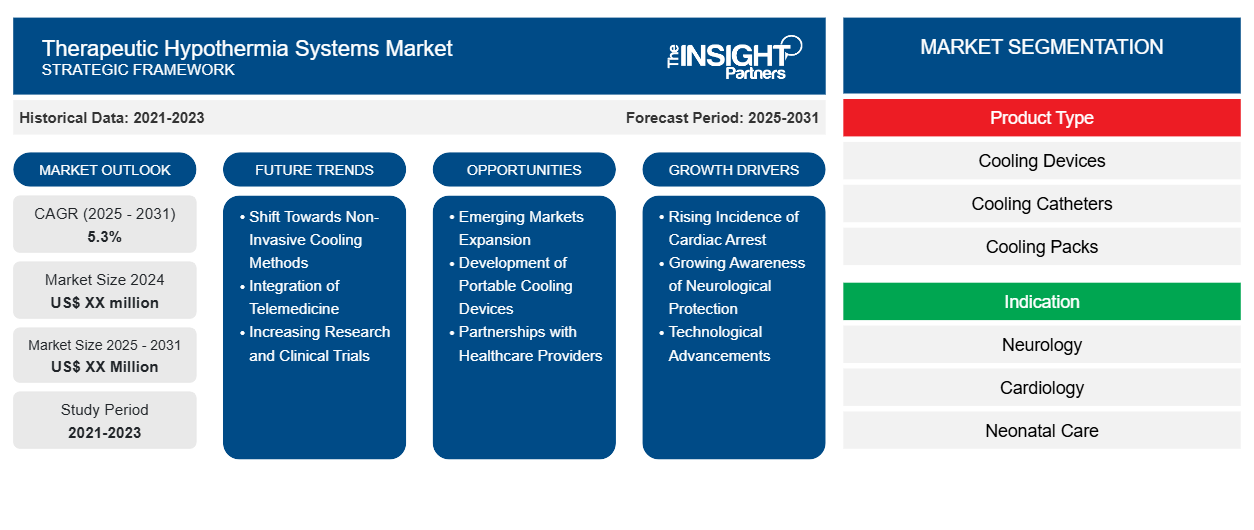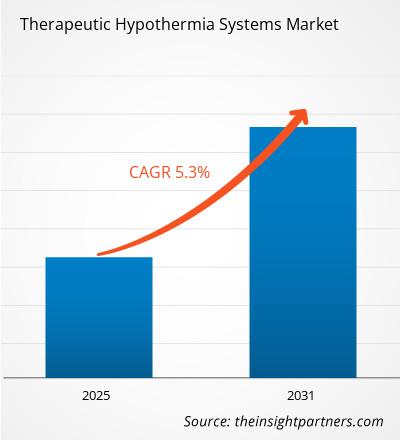The Therapeutic Hypothermia Systems Market is expected to register a CAGR of 5.3% from 2025 to 2031, with a market size expanding from US$ XX million in 2024 to US$ XX Million by 2031.
The report is segmented by Product Type (Cooling Devices, Cooling Catheters, Cooling Packs), Indication (Neurology, Cardiology, Neonatal Care), End-use (Hospitals, Specialty Clinics, ASCs). The global analysis is further broken-down at regional level and major countries. The Report Offers the Value in USD for the above analysis and segments.
Purpose of the Report
The report Therapeutic Hypothermia Systems Market by The Insight Partners aims to describe the present landscape and future growth, top driving factors, challenges, and opportunities. This will provide insights to various business stakeholders, such as:
- Technology Providers/Manufacturers: To understand the evolving market dynamics and know the potential growth opportunities, enabling them to make informed strategic decisions.
- Investors: To conduct a comprehensive trend analysis regarding the market growth rate, market financial projections, and opportunities that exist across the value chain.
- Regulatory bodies: To regulate policies and police activities in the market with the aim of minimizing abuse, preserving investor trust and confidence, and upholding the integrity and stability of the market.
Therapeutic Hypothermia Systems Market Segmentation
Product Type
- Cooling Devices
- Cooling Catheters
- Cooling Packs
Indication
- Neurology
- Cardiology
- Neonatal Care
End-use
- Hospitals
- Specialty Clinics
- ASCs
Customize This Report To Suit Your Requirement
Get FREE CUSTOMIZATIONTherapeutic Hypothermia Systems Market: Strategic Insights

-
Get Top Key Market Trends of this report.This FREE sample will include data analysis, ranging from market trends to estimates and forecasts.
Therapeutic Hypothermia Systems Market Growth Drivers
- Rising Incidence of Cardiac Arrest: The increasing prevalence of cardiac arrest and related neurological injuries is a significant driver for therapeutic hypothermia systems. Medical professionals are increasingly recognizing the benefits of hypothermia in reducing brain damage post-cardiac arrest. As more hospitals adopt these systems to improve patient outcomes, the demand for therapeutic hypothermia technologies continues to grow.
- Growing Awareness of Neurological Protection: There is a heightened awareness regarding the importance of neurological protection following traumatic brain injuries and cardiac arrest. Therapeutic hypothermia has been clinically proven to mitigate brain damage and improve recovery rates. This growing recognition among healthcare providers and patients is driving the adoption of hypothermia systems in critical care settings.
- Technological Advancements: Innovations in therapeutic hypothermia systems, such as improved cooling techniques and monitoring technologies, are propelling market growth. Enhanced systems provide more precise temperature control and patient safety features, making them more effective and user-friendly. These advancements encourage healthcare facilities to invest in such technologies to optimize patient care and improve clinical outcomes.
Therapeutic Hypothermia Systems Market Future Trends
- Shift Towards Non-Invasive Cooling Methods: The therapeutic hypothermia market is witnessing a trend toward non-invasive cooling techniques, such as surface cooling pads and blankets. These methods are gaining popularity due to their ease of use and reduced risk of complications associated with invasive techniques. Medical professionals prefer these non-invasive systems for their effectiveness and comfort for patients.
- Integration of Telemedicine: The integration of telemedicine into therapeutic hypothermia protocols is emerging as a significant trend. Remote monitoring and consultation can enhance patient management during hypothermia treatment. This trend allows healthcare providers to adjust treatment plans in real-time, ensuring optimal patient outcomes while minimizing risks associated with delayed interventions.
- Increasing Research and Clinical Trials: There is a growing emphasis on research and clinical trials focused on therapeutic hypothermia applications. Ongoing studies aim to expand the indications for hypothermia beyond cardiac arrest to other conditions, such as stroke and traumatic brain injury. This focus on research is expected to drive innovation and adoption of hypothermia systems in various clinical settings.
Therapeutic Hypothermia Systems Market Opportunities
- Emerging Markets Expansion: The therapeutic hypothermia system market presents significant opportunities in emerging economies, where healthcare infrastructure is rapidly developing. As awareness of neurological protection grows, there is potential for increased adoption of hypothermia systems in hospitals and critical care units. Companies can target these regions by offering cost-effective solutions tailored to local healthcare needs.
- Development of Portable Cooling Devices: There is a growing demand for portable therapeutic hypothermia systems that can be used in pre-hospital settings or during patient transport. Developing compact, user-friendly devices can enhance accessibility and improve patient outcomes, especially in emergency situations. This innovation can create new market segments and attract a broader customer base.
- Partnerships with Healthcare Providers: Collaborations between therapeutic hypothermia system manufacturers and healthcare providers can create opportunities for product development and market penetration. By working together, companies can ensure that their systems meet the specific needs of hospitals and critical care units, facilitating better integration and usage in clinical practice.
Therapeutic Hypothermia Systems Market Report Scope
| Report Attribute | Details |
|---|---|
| Market size in 2024 | US$ XX million |
| Market Size by 2031 | US$ XX Million |
| Global CAGR (2025 - 2031) | 5.3% |
| Historical Data | 2021-2023 |
| Forecast period | 2025-2031 |
| Segments Covered |
By Product Type
|
| Regions and Countries Covered |
North America
|
| Market leaders and key company profiles |
|
Therapeutic Hypothermia Systems Market Players Density: Understanding Its Impact on Business Dynamics
The Therapeutic Hypothermia Systems Market is growing rapidly, driven by increasing end-user demand due to factors such as evolving consumer preferences, technological advancements, and greater awareness of the product's benefits. As demand rises, businesses are expanding their offerings, innovating to meet consumer needs, and capitalizing on emerging trends, which further fuels market growth.

Key Selling Points
- Comprehensive Coverage: The report comprehensively covers the analysis of products, services, types, and end users of the Therapeutic Hypothermia Systems Market, providing a holistic landscape.
- Expert Analysis: The report is compiled based on the in-depth understanding of industry experts and analysts.
- Up-to-date Information: The report assures business relevance due to its coverage of recent information and data trends.
- Customization Options: This report can be customized to cater to specific client requirements and suit the business strategies aptly.
The research report on the Therapeutic Hypothermia Systems Market can, therefore, help spearhead the trail of decoding and understanding the industry scenario and growth prospects. Although there can be a few valid concerns, the overall benefits of this report tend to outweigh the disadvantages.
Frequently Asked Questions
- Historical Analysis (2 Years), Base Year, Forecast (7 Years) with CAGR
- PEST and SWOT Analysis
- Market Size Value / Volume - Global, Regional, Country
- Industry and Competitive Landscape
- Excel Dataset
Recent Reports
Testimonials
Reason to Buy
- Informed Decision-Making
- Understanding Market Dynamics
- Competitive Analysis
- Identifying Emerging Markets
- Customer Insights
- Market Forecasts
- Risk Mitigation
- Boosting Operational Efficiency
- Strategic Planning
- Investment Justification
- Tracking Industry Innovations
- Aligning with Regulatory Trends







 Get Free Sample For
Get Free Sample For